| Srl | Item |
| 1 |
ID:
119664
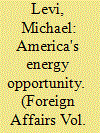

|
|
|
|
|
| Publication |
2013.
|
| Summary/Abstract |
The U.S. energy revolution is not confined to a single fuel or technology: oil and gas production, renewable energy, and fuel-efficient automobile technologies all show great promise. To best position the country for the future, U.S. leaders should capitalize on all these opportunities rather than pick a favorite; the answer lies in 'most of the above.'
|
|
|
|
|
|
|
|
|
|
|
|
|
|
|
|
| 2 |
ID:
104868
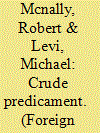

|
|
|
| 3 |
ID:
120174


|
|
|
|
|
| Publication |
2013.
|
| Summary/Abstract |
In "Protecting 'The Prize': Oil and the U.S. National Interest," Eugene Gholz and Daryl G. Press present an important counterargument to many common but overwrought worries about energy security. Yet they themselves go too far in the opposite direction. Gholz and Press argue that only three types of potential oil market disruptions could induce "particularly painful" adjustments and hence rise to the highest level: consolidation of a large fraction of Persian Gulf reserves under a single power, domestic instability in Saudi Arabia, and blockage of the Strait of Hormuz. I argue in this response that Gholz and Press confine the second and third scenarios too narrowly, and hence understate the security risks stemming from U.S. dependence on oil.
|
|
|
|
|
|
|
|
|
|
|
|
|
|
|
|
| 4 |
ID:
058768
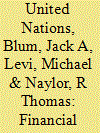

|
|
|
|
|
| Publication |
United Nations, Office for Drug Control and Crime,
|
| Description |
117p.
|
|
|
|
|
|
|
|
|
|
|
|
Copies: C:1/I:0,R:0,Q:0
Circulation
| Accession# | Call# | Current Location | Status | Policy | Location |
| 045652 | 342/ESQ 045652 | Main | On Shelf | General | |
|
|
|
|
| 5 |
ID:
117957
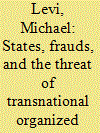

|
|
|
|
|
| Publication |
2012.
|
| Summary/Abstract |
Fraud and corruption are very serious threats to some states and are harmful to all; however, this threat is seldom connected to transnational organized crime (TOC). We cannot examine social problems in a vacuum; we have to construct images of threats through the lens of the social and political threats posed by different aspects of crime and its organization. Harm and threat are not just about their economic cost, but also about how different phenomena hurt our confidence that we can control our surroundings and our future expectations. This anxiety can affect entities such as nation states or even trans-state entities such as "Ummah Wahidah"-the Islamic global community. The aim of this article is threefold: to disentangle the real and imagined threats of fraud, detail the involvement of transnational organized crime groups in fraud, and determine who or what can be reasonably described as threatened by these phenomena. This article rejects the implicit binary view that states are either threatened or not threatened, referring rather to a scale of threat to both states and different sectors within the state. This article critiques the value of Moisés Naím's concept of 'mafia state' to explaining and understanding fraud.
|
|
|
|
|
|
|
|
|
|
|
|
|
|
|
|
| 6 |
ID:
116648
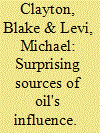

|
|
|
|
|
| Publication |
2012.
|
| Summary/Abstract |
Should countries care about where they get their oil? As Middle Eastern oil exports to Asia rise while shipments to the United States and Europe fall, analysts are asking whether this trade shift will have geopolitical consequences, drawing China politically closer to the Middle East while driving the West further away. In North America, the debate over the Keystone XL pipeline, which would have transported crude from Canada to the US Gulf of Mexico, featured proponents who trumpeted the value of relying on a friendly source of oil and sceptics who insisted that the origin of US oil imports doesn't matter. Throughout the world, many still worry that dependence on the Persian Gulf leaves countries exposed to blackmail; other analysts, though, insist that markets have rendered such threats impotent.
|
|
|
|
|
|
|
|
|
|
|
|
|
|
|
|
| 7 |
ID:
115855
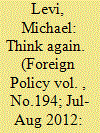

|
|
|
| 8 |
ID:
129748
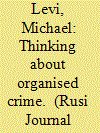

|
|
|
|
|
| Publication |
2014.
|
| Summary/Abstract |
The term 'organised crime' suggests a greater level of coherence than exists in reality, while the major threat imagery it evokes is useful for some purposes but counterproductive for others. While some organised criminal groups and activities pose a threat to national security, most affect human security at a sub-national level. Michael Levi critically examines some economic, physical and perception features of the harms and threats encompassed by organised crime, and discusses their implications for strategic and tactical interventions.
|
|
|
|
|
|
|
|
|
|
|
|
|
|
|
|